|
|
|
Sort Order |
|
|
|
Items / Page
|
|
|
|
|
|
|
| Srl | Item |
| 1 |
ID:
179893
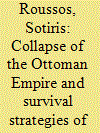

|
|
|
|
|
| Summary/Abstract |
The millet system compartmentalised religious communities into different sociopolitical environments under the overarching Ottoman imperial realm. However, during the nineteenth century, state transformation and crisis and the global re-allocation of political and economic power led to the exacerbation of ethnoreligious conflicts. Facing the collapse of the Ottoman imperium and the threat of extinction, the Greek Orthodox, Assyrian, Chaldean and Syrian Orthodox communities developed five survival strategies. The first was co-optation by state authorities; the second, protection of the Great Powers; the third armed resistance and the creation of autonomous enclaves; the fourth was that of exodus; and the last was to integrate themselves into Arab nationalism, lowering the banner of religion and becoming strong advocates of an Arab national identity encompassing Muslims and Christians alike. This paper aims to present a comparative approach to these strategies in the period from the beginning of the twentieth century to the formation of the Mandates
|
|
|
|
|
|
|
|
|
|
|
|
|
|
|
|
| 2 |
ID:
179889
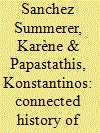

|
|
|
|
|
| Summary/Abstract |
The special issue critically explores, at a micro and macro level, the structural role and religious, cultural and political interactions of the Greek-Orthodox, Melkite and Syriac communities in late Ottoman and Mandate Syria and Palestine. It seeks to identify archival gaps, and to link the study of the micro-scale level of everyday cultural and religious life to the macro-narratives of global change affecting Christian communities, in a connected perspective, via dynamics of cultural and religious personal and institutional interactions. The Christian communities, both as institutions and lay bodies, are of special interest for the field of Levantine studies, since they were placed at the heart of the local power game, expressing the quest for social emancipation, while also keeping close links with diplomatic actors, colonial institutions, and foreign religious agents. The research presented lies on the idea that the communities in focus were inextricably linked, being actors operating within the same multi-ethnic periphery, having the same legal status, and being in contact to foreign agents, while at the same time politically dependent to the centralized ottoman and mandatory authorities.
|
|
|
|
|
|
|
|
|
|
|
|
|
|
|
|
| 3 |
ID:
179894
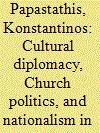

|
|
|
|
|
| Summary/Abstract |
The transition period from the Ottoman withdrawal from Jerusalem to the establishment of British rule was critical for the Orthodox Church. On the one hand, the rule of Patriarch Damianos was contested by a powerful opposition within the Brotherhood of the Holy Sepulchre, which was supported by the government in Athens. On the other hand, the Arab laity sided with Damianos, putting at the same time pressure on the new administration to upgrade its status both at a political and religious level. This paper attempts to contextually sketch out the historical course of events, paying special attention on the religious policy agenda of the new authorities, as well as the diplomatic and cultural factors influencing the decision-making process. Overall, the paper suggests that the internal church crisis under examination was determined by the historical reformulation caused by WWI, the development of Arab nationalism, national ambitions in Athens, and British local and diplomatic policy objectives. Moreover, it argues that this period of crisis should probably be viewed as the starting point of the modern history of the institution (This article extends and updates the analysis of my previous paper, Papastathis 2009 (in Greek). In particular, it employs and contextually analyses new archival sources from the Historic and Diplomatic Archive of the Greek Ministry of Foreign Affairs. The new archival material is related to the intra-religious background and institutional framework, and to the diplomatic and political aspects of the question under examination).
|
|
|
|
|
|
|
|
|
|
|
|
|
|
|
|
| 4 |
ID:
179891


|
|
|
|
|
| Summary/Abstract |
The civil war in Mount Lebanon and the massacres of Christians in Damascus and other cities in 1860 ushered in a new era to the Levant region, leading to the establishment of the Mount Lebanon Mutassarifate and strengthening the move towards confessionalism in public life. This paper, based on unpublished documents from the Archives of the Greek Ministry of Foreign Affairs, as well as articles in the Greek press and literary reviews, aims to explore the image of the various ethnic, linguistic and religious groups of Syria in the Kingdom of Greece during the 1840s–1860s. The presence of Greek merchants in the region and above all the strong ecclesiastical ties of the local Greek Orthodox Patriarchate of Antioch with the Constantinople Patriarchate add broader perspectives to the Greek ‘discovery’ of Syria. The character and ‘mission’ of the Greek Orthodox Church in the region was analysed by the Greek consuls in Beirut, who also formulated or advanced blueprints for the aims of Greek ‘cultural diplomacy’ in Syria. The different shades of opinion were highlighted during the first Greek ‘humanitarian intervention’, in the summer and autumn of 1860, when Greek war vessels sailed to Beirut to assist the needy and transport some local Christian refugees to Greece. For the government in Athens, this mission was a question of prestige. For Greek journalists and writers, it had much broader implications since it reinforced a feeling of cultural affinity between Greeks of the nation-state and the Christians of Syria.
|
|
|
|
|
|
|
|
|
|
|
|
|
|
|
|
| 5 |
ID:
179897
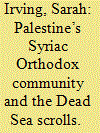

|
|
|
|
|
| Summary/Abstract |
In 1947, a shepherd in the hills north of the Dead Sea visited a contact in Bethlehem, a dealer of antiquities to foreign visitors, offering fragments of written material. The dealer, from the Syriac community, was unsure of the items’ value and began enquiries which followed Syriac Orthodox religious and intellectual networks. Despite initial scepticism, the fragments were the first of the now globally famous Dead Sea Scrolls, and ever since have been surrounded by rumours and controversy. Inextricably entwined in these has been the Palestinian Syriac Orthodox church, in a pattern of involvements which link this small Christian community with the creation of knowledge in and about Mandate Palestine, the fate of its members during the Nakba, and internal competition for ownership of valuable resources in a community fragmented by the 1947–1949 conflict. In this paper, I reconstruct the role of Syriac Orthodox community members in the discovery of the Dead Sea Scrolls, examining how the parts they played were informed by their status in late Mandate Palestine. As a counterpoint to this, the case also highlights how the needs of the community – particularly in the wake of the Nakba – were tied to a kind of cultural diplomacy as the head of the church in Jerusalem, Mar Samuel, sought to frame his community as refugees, as Christian Palestinians, and as owners and valid beneficiaries of Palestinian archaeological heritage.
|
|
|
|
|
|
|
|
|
|
|
|
|
|
|
|
| 6 |
ID:
179892


|
|
|
|
|
| Summary/Abstract |
The Palestinian cultural Nahḍa that emerged with local nationalism in the early twentieth century was in part carried forward by members of the Arab-Palestinian Orthodox community. Their status in the Palestinian and Arab society of the time has to be contextualised in their relationship to the Russian language and even more so to the Russian educational enterprise in Palestine. Some of these cultural agents attended the schools of the Imperial Orthodox Palestine Society (IOPS) which were first set up in isolated villages in the Galilee region and later in Nazareth and Beit Jala. This article, based primarily on Arabic-Palestinian sources as well as my research in some of the looted Palestinian archives located in Jerusalem, stresses the relationship between the Russian educational missionary enterprise in Palestine and the leaders of the Arab Nahḍa. The historical development of this Russian enterprise, which included the development of different schools and teaching programmes, is connected to case studies of a number of cultural agents and the fields in which they excelled (teaching, translation, the press, literature, music and theatre). This article finally focuses on the Palestinian Nahḍawi cultural field which has been neglected by previous research for various reasons (linguistics, access to archives and the prevalence of Egypt and Lebanon in the study of Nahḍa themes). Focusing on a cultural approach, this article provides a better understanding of the making of Palestinian national and cultural consciousness. (I would like to dedicate this paper as a tribute to Ḥanā abū Ḥanā (1928-).
|
|
|
|
|
|
|
|
|
|
|
|
|
|
|
|
| 7 |
ID:
179890
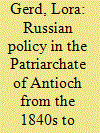

|
|
|
|
|
| Summary/Abstract |
Syria and Lebanon occupied a special place in the competition of the nineteenth-century Great Powers in the Eastern Question. Having entered this struggle, the Russian state used its accustomed routes of influence through the Orthodox Church. This article argues that the traditional practice of sending donations without asking for reports on their usage did not work in the nineteenth and early twentieth centuries. Diplomatic pressure combined with control over the money sent worked better. Confessional instruments of policy thus found new patterns in the age of nationalism. After the Crimean War, Russian imperialism was opposed to the Greek Great Idea in the Balkans and the Middle East; in Syria and Palestine Russian church policy was based on support for the Arabs. All methods of ‘soft power’ (the foundation of schools for the Arab population, attempts to (re)convert the Melkites to Orthodoxy, and gradual Arabisation of the high clergy of the Patriarchate of Antioch) were aimed at putting Syria and Lebanon under Russian control. Unlike in Palestine or Alexandria, this policy was successful: in the first decades of the nineteenth century the Arab Patriarchate of Antioch was completely financed by the Russian government. This article investigates whether the policy of Arabisation could have brought about stability in the region, and whether it really contributed to the realisation of the idea of Orthodox unification under Russian control.
|
|
|
|
|
|
|
|
|
|
|
|
|
|
|
|
| 8 |
ID:
179895


|
|
|
|
|
| Summary/Abstract |
This paper focuses on internal developments within the Melkite Church during the Mandate period. Since 1882, the French missionary order of the White Fathers had educated Melkite priests in the seminary of Saint Anne in Jerusalem. Throughout the following decades, this had led to the formation of a new type of Melkite clergy. After the tenure of Melkite Patriarch Demetrius Qādī (1919–1925) alumni of Saint Anne held almost half of all Melkite episcopal seats. His successor Cyril IX Moghabghab (1925–1947) was critical of this development, suspecting the establishment of a ‘church within the church’. This paper is a case study of how Patriarch Moghabghab acted against the Saint Anne-educated clergy in his Church and tried to gain more control over the seminary. It explores the internal conflict revealed by these incidents and analyses how the responsible dicasteries of the Holy See tried to address these disturbances. Special attention is given to the use of Orientalist stereotypes by Latin clergy. The colonial mindset of Latin dignitaries towards Eastern clergy had an impact on how the Holy See regarded the Melkite Patriarch and resolved the differences surrounding Saint Anne seminary. This examination of intra-Catholic relations on regional and transnational level was carried out through research in the archives of the Vatican.
|
|
|
|
|
|
|
|
|
|
|
|
|
|
|
|
| 9 |
ID:
179896


|
|
|
|
|
| Summary/Abstract |
The point of departure for this article is an unexploited source: the minutes of the Greek Ladies’ Union covering the last ten years of the British mandate period. For this period in Jerusalem, women’s voices are rare. By creating this Union along ethnic and national lines in 1924, the ladies also formed a place for philanthropy, social gatherings and the exchange of views on communal and other issues. The minutes of their gatherings bring to us unheard voices of Jerusalem and the Greek community of the city in particular. An analysis of these minutes gives us the opportunity to understand the reasons behind the creation of this association, the different strategies women developed to make their views known within their community, to examine their philanthropic activities within the charitable universe of Jerusalem and, most importantly, to deal with multiple political developments at different levels during a period which is sensitive regarding the future of the Middle East, the Christian communities of Jerusalem and the Greek presence in the region.
|
|
|
|
|
|
|
|
|
|
|
|
|
|
|
|
|
|
|
|
|